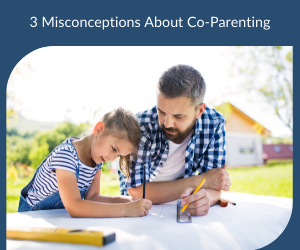
When parents go through the divorce process, some may not think through what parenting with their ex will be like once the divorce is final or they may have assumptions about it. Co-parenting brings on a whole new relationship and situation to navigate. While some parents find that co-parenting with their ex is easier than parenting when they were married, others may find that it is harder since they would rather not have to be in contact with their ex at all.
Co-parenting can be a challenge at times; however, with the right mindset, parents can approach the situation positively and set themselves, their children, and even their ex up for success. One way to help divorced parents approach co-parenting is to discuss a few misconceptions that each side may have. Below are a few of these fallacies that, if avoided, can help the process go smoothly:
- I’ll take away parenting time from the other parent if they don’t cooperate. One parent may think that they can take parenting time away from the other parent if that parent is not cooperating. This approach can be contrary to the best interests of the children and be a violation of the Court’s custody, resulting in negative repercussions for the parent. One cannot withhold court-ordered parenting time from the other parent, and even more so, doing this can cause problems for your children who emotionally need and want to spend time with each parent.
- My children should know the details about the court proceedings. This is also another misconception that is not true. Parents should not be communicating the details of the court proceedings to their children – especially with the intention to skew how the children see the other parent. For example, it should not be discussed how you feel about the other parent or who is paying child support. Allowing the children to have their own feelings toward each parent without being pulled in a specific direction is important. Additionally, the details of the court proceedings are likely too heavy for a child to have on their minds. As children become older and are teenagers nearing graduation from high school, both parents, together, can talk with the children to get their feedback on any needed adjustments or changes to the custody schedule.
RELATED: Read these tips on how to successfully co-parent.
- My ex and I will need to agree on everything related to our children. While it is important for children to have consistency between households, it is also important to be OK with minor differences. For example, if one parent does not follow the same food choices that the other parent would follow in their home, as long as the parent is ensuring the child is healthy and safe, and has a well-rounded diet for the most part, perhaps the other parent should let their frustrations go. On the other hand, if it does not seem that the child is in a safe environment, emotionally or physically, it is likely a time when action needs to be taken, such as consulting with an experienced attorney.
If you are approaching a co-parenting relationship after a divorce, we hope these misconceptions will help you approach the situation with the right mindset. Additionally, if you have questions about co-parenting or if you run into an issue with your co-parenting relationship, we advise that you contact and lean on an experienced divorce attorney to help guide you as there could be times when returning to court on a post-decree motion is advisable.
If you want to learn more about how our experienced attorneys can help you, contact us online or call our office in Pittsburgh, Pennsylvania at 412-261-4040.
FAMILY LAW SERVICES
Divorce
Legal Separation
Prenuptial & Postnuptial Agreements
Tax Issues
Fees
Adoption
Same-Gender Marriage
Domestic Partnerships
Child Custody
Family Support
Mediation in Divorce Matters
Collaborative Law Services










